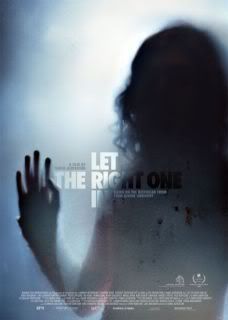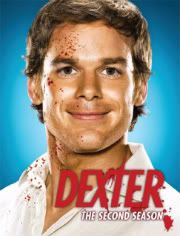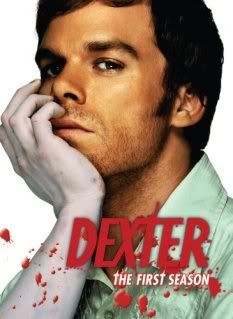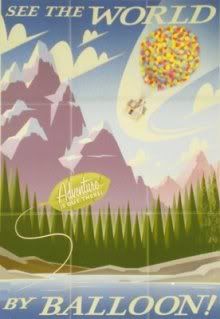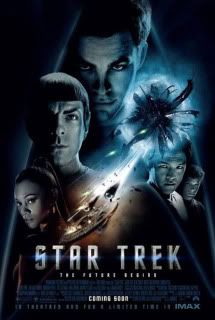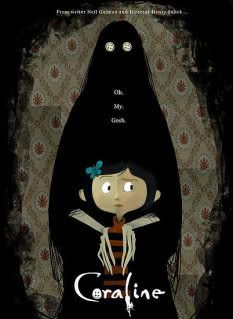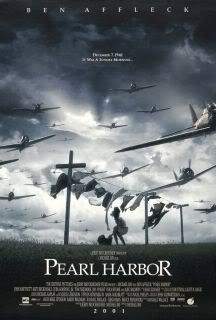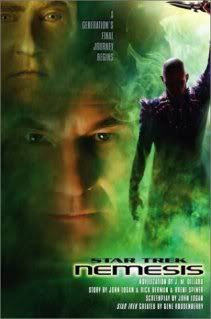 I'm not a psychic, but I am more perceptive than you. When I say that I fucking knew that Dexter would shit itself inside out when the first two seasons' cocaine barrel ran dry, I'm not bragging, I'm just using my powers for the good of the land.
I'm not a psychic, but I am more perceptive than you. When I say that I fucking knew that Dexter would shit itself inside out when the first two seasons' cocaine barrel ran dry, I'm not bragging, I'm just using my powers for the good of the land.The first season tracked Dexter's interactions with another serial killer, getting into his head in a very talky, meticulous way while the second season made Dexter the protagonist of a thriller, engaging his character with more action and suspense (more my syringe of poison). Now we're apparently out of angles to go at Dexter's character with, and like so many dramas the writers need to find new things to keep the audience's attention. Cheap gimmicks and violence porn will take the place of the well-written, meticulous character study we've all gotten used to streaming off the finest television pirating websites that 1997 can buy.
The writers' and producers' gimmick is the best friend one. A best friend that Dexter can go golfing with and talk about power tools with and make friendship bracelets with and slit throats with and one that he can eventually drive to the brink of sanity with violence and secrets. Which actually sounds like a good way to approach a story, but there were fundamental flaws in that idea that the show was never going to get around. It's my inclination that Miguel Prado (the best bud in question) being more sympathetic and wanting to help Dexter control his urges but eventually being driven mad by the evil that is only just below Dexter's skin would make for a far more interesting arc. It's unfortunate that the writers opt to make Prado a scheming villain instead, presumably as a quick way to ultimately dispatch the character once the season is over. That gives us nine or so episodes of Prado being a good guy and getting through to Dexter's inner demons, and then throwing him away by making him evil, even contradictory towards his established character once his character has run its course, which strikes me as terribly cheap. For one, it's hard to buy Prado's deception when he's been more like a little kid than a brilliant assistant district attorney. Also, he doesn't seem to understand how being a district attorney works, or at least he has a thirteen-year-old's view of it. After fourteen years of being an ADA, he still hasn't figured out why defense attorneys are there and thinks that district attorneys are the untouchable kingpins of Miami that cannot be stopped even by death.
There's a completely separate case that all our favorite Miami Metro Homicide team is on while Dexter dicks around at sleepovers, and it could not be more lame. It's like an episode of CSI Miami stretched out over twelve episodes. There's just nothing of value or substance in this plot line and it's the worst, most obvious sign that the writers were out of material. They're hunting a serial killer who is looking for a drug dealer that disappeared (Dexter killed him, setting off a string of murders that effects him in no way! They never even mention it!) and that's it. There's nothing else to it. They talk to witnesses who give them clues that, with their police resources, they use to tighten the gap between them and the killer, which like listening to someone describe an episode of Law & Order for two hours. And when they run out of boring police procedural shit, they go to Deborah, who's having a retarded interracial romance with some punk, which is cool because last time we saw her she was balling a Peter Fonda lookalike.
The show is aiming to make Dexter more normal, which is at least an arc for him to go through, but I'm not convinced it's for the best. It's easy to relate to him getting married and having a baby, but him pretending to be normal or doing routine stuff has never been what makes this character interesting. Thankfully, Michael C. Hall is still up to the task of making his character compelling. I've realized that the way Dexter interacts with people when he's preparing to kill someone requires an actor with a complete and comprehensive knowledge of every social grace of every group, ethnicity, age and whatever. Hall understands his character very well. It's a performance with a lot of ticks and sudden changes in demeanor. There are shades of classic movie spies in it, strangely. Also, and I don't know whether to accredit this to Hall's performance or his anonymous looks - I suppose both - but the scenes where he kills are by far the best things about this season. It's a shame there are fewer of them this time, but Hall's performance is very intense. So many of his emotions are faked, and faked so well that we often forget he's faking, but one of the few times we get any real, genuine emotion from Dexter is when he has someone on his table and his words come out in a controlled hiss of pure fucking evil that plays so well against his happy family man/mild-mannered blood spatter analyst image and for just a few moments the show lets Dexter become the villain. There's something deliriously macabre about his apron and his clothing in those scenes, with their muted greens and grays and crisp, freshly laundered look.
I don't know if this season really is host to better acting from Hall or if I just never really grasped that aspect of the performance before now. I'll lean towards the former so that I can credit this ass train of a season with less and I can end with a statement to the writers.
If you run out of story ideas for your show and you don't want the swimming pool to stop getting filled with cocaine-basted roast chickens every morning, you're going to have to make the executives in charge understand that your show needs to stay on the air. And since you've been freebasing Oxycontin off script pages all morning, you're going to have to come up with something fast, but that thing you come up with fast should no longer be "we'll waste such great performers in such great roles", because a savvy studio executive will see through that and have you fed to alligators and your former body parts will spend the rest of their existence being set dressing in Australian comedies. Although I wonder if I could get another Jurassic Park film made with that logic.
3/10

